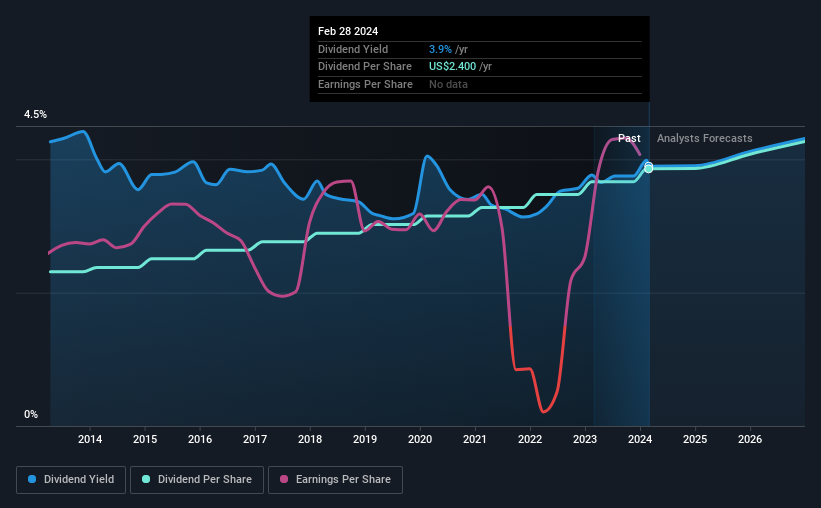- United States
- /
- Other Utilities
- /
- NYSE:PEG
Public Service Enterprise Group's (NYSE:PEG) Upcoming Dividend Will Be Larger Than Last Year's

Public Service Enterprise Group Incorporated (NYSE:PEG) has announced that it will be increasing its dividend from last year's comparable payment on the 29th of March to $0.60. This makes the dividend yield about the same as the industry average at 3.9%.
View our latest analysis for Public Service Enterprise Group
Public Service Enterprise Group's Dividend Is Well Covered By Earnings
We aren't too impressed by dividend yields unless they can be sustained over time. The last payment was quite easily covered by earnings, but it made up 249% of cash flows. This signals that the company is more focused on returning cash flow to shareholders, but it could mean that the dividend is exposed to cuts in the future.
Looking forward, earnings per share is forecast to fall by 16.9% over the next year. If the dividend continues along the path it has been on recently, we estimate the payout ratio could be 56%, which is comfortable for the company to continue in the future.

Public Service Enterprise Group Has A Solid Track Record
The company has a sustained record of paying dividends with very little fluctuation. The annual payment during the last 10 years was $1.44 in 2014, and the most recent fiscal year payment was $2.40. This implies that the company grew its distributions at a yearly rate of about 5.2% over that duration. Companies like this can be very valuable over the long term, if the decent rate of growth can be maintained.
The Dividend Looks Likely To Grow
Some investors will be chomping at the bit to buy some of the company's stock based on its dividend history. We are encouraged to see that Public Service Enterprise Group has grown earnings per share at 12% per year over the past five years. The lack of cash flows does make us a bit cautious though, especially when it comes to the future of the dividend.
Our Thoughts On Public Service Enterprise Group's Dividend
Overall, we always like to see the dividend being raised, but we don't think Public Service Enterprise Group will make a great income stock. While the low payout ratio is a redeeming feature, this is offset by the minimal cash to cover the payments. We don't think Public Service Enterprise Group is a great stock to add to your portfolio if income is your focus.
It's important to note that companies having a consistent dividend policy will generate greater investor confidence than those having an erratic one. However, there are other things to consider for investors when analysing stock performance. Just as an example, we've come across 3 warning signs for Public Service Enterprise Group you should be aware of, and 2 of them are concerning. Is Public Service Enterprise Group not quite the opportunity you were looking for? Why not check out our selection of top dividend stocks.
If you're looking to trade Public Service Enterprise Group, open an account with the lowest-cost platform trusted by professionals, Interactive Brokers.
With clients in over 200 countries and territories, and access to 160 markets, IBKR lets you trade stocks, options, futures, forex, bonds and funds from a single integrated account.
Enjoy no hidden fees, no account minimums, and FX conversion rates as low as 0.03%, far better than what most brokers offer.
Sponsored ContentNew: Manage All Your Stock Portfolios in One Place
We've created the ultimate portfolio companion for stock investors, and it's free.
• Connect an unlimited number of Portfolios and see your total in one currency
• Be alerted to new Warning Signs or Risks via email or mobile
• Track the Fair Value of your stocks
Have feedback on this article? Concerned about the content? Get in touch with us directly. Alternatively, email editorial-team (at) simplywallst.com.
This article by Simply Wall St is general in nature. We provide commentary based on historical data and analyst forecasts only using an unbiased methodology and our articles are not intended to be financial advice. It does not constitute a recommendation to buy or sell any stock, and does not take account of your objectives, or your financial situation. We aim to bring you long-term focused analysis driven by fundamental data. Note that our analysis may not factor in the latest price-sensitive company announcements or qualitative material. Simply Wall St has no position in any stocks mentioned.
About NYSE:PEG
Public Service Enterprise Group
Through its subsidiaries, operates in electric and gas utility, and nuclear generation businesses in the United States.
Average dividend payer with questionable track record.


